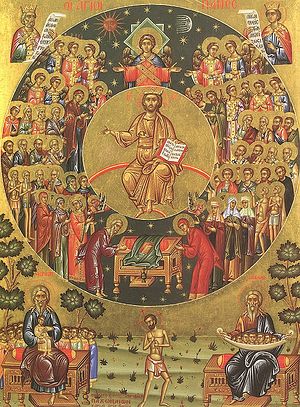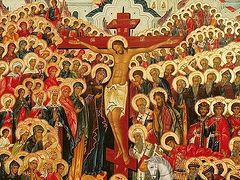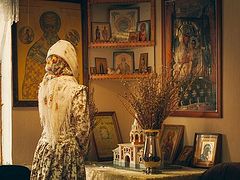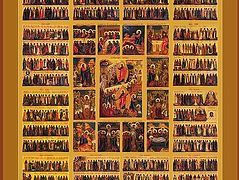 Hebrews 11:33-12:2; Matthew 10:32-33, 37-38; 19:27-30
Hebrews 11:33-12:2; Matthew 10:32-33, 37-38; 19:27-30
“The blood of the martyrs is the seed of the church.” This ancient saying conveys a deep truth about the Christian faith that we would probably rather not acknowledge, at least with reference to our own lives. The root meaning of the word “martyr” is witness, and those who refuse to deny Christ even to the point of death provide powerful testimony to the Savior Who has liberated them from the fear of the grave. On this Sunday of All Saints, we commemorate all those who are martyrs for Christ, even though we do not know all their names. The root meaning of the word “saint” is holy, and today we remember all people whose lives have shined brightly with the holiness of God. We must do so in a way that not only honors them, but also inspires us to follow their blessed example of bearing witness to the Lord in every dimension of our lives.
It may seem strange that Orthodox Christianity gives so much attention to martyrs and saints. To speak of those who die for their faith is to recall instances of murder. Why would a religion give so much attention to such an unpleasant subject? Here we must remember that the Lord’s resurrection is the absolutely essential basis of the Christian faith. Our Risen Savior provides the lens through which we view death as a pathway to eternal life. Those united to Him in holiness will refuse to deny Him, even if the consequences of doing so are fatal. Instead of people rejecting Christianity out of the fear of martyrdom, the witness of those who died for Christ actually drew people to the Church during the Roman persecutions. People took notice that the Christians did not fear death and were willing to suffer the worst that the empire could do to them out of faithfulness to the Lord. To this day in some parts of the world, Christians do exactly that as they provide testimony with their own blood to the Savior’s victory over the grave.
The example of all the saints and martyrs should inspire us to bear faithful witness to Christ in our own lives. As our epistle reading states, “Therefore, since we are surrounded by so great a cloud of witnesses, let us also lay aside every weight, and sin which clings so closely, and let us run with perseverance the race that is set before us, looking to Jesus the pioneer and perfection of our faith.” We must not excuse ourselves from being held accountable to the martyrs’ holy example because no one is threatening to murder us for our faith. Instead, we must bear witness to the Savior in the midst of whatever challenges we face today in our own lives. Christ said, “Everyone who acknowledges Me before men, I also will acknowledge before my Father Who is in heaven; but whoever denies Me before men, I also will deny before My Father Who is in heaven.” Though not in as dramatic a way as physical martyrdom, each of us acknowledges or denies Christ every day of our lives. Remember the Lord’s description of those who will be blessed in the heavenly kingdom: the poor in spirit; those who mourn for their sins; the meek; those who hunger and thirst for righteousness; the merciful; the pure in heart; the peacemakers; and those who are persecuted for righteousness’ sake. If we are to bear witness for Christ, these beatitudes must become characteristic of us. Otherwise, we will lack the strength to conform our character to His as “the salt of the earth” and “the light of the world.” If our lives are not characterized by actions that lead others to glorify God, then we are in effect denying that we have anything to do with Jesus Christ. (Matt. 5: 3-16)
Those who are truly united with the Lord will become living icons of His fulfillment of the human person in the divine image and likeness. The Savior did not come to give us certain religious ideas or to make us feel a certain way. He certainly did not die and rise from the grave in order to create a cultural or political group over against others. He did so in order to make us “partakers of the divine nature” as we unite every dimension of ourselves to Him in holiness. Regardless of the particulars of our personal circumstances, to shine brightly with His grace is to become a martyr and a saint.
Of course, that is easier said than done. The Savior said, “He who loves father or mother more than Me is not worthy of Me; and he who loves son or daughter more than Me is not worthy of Me; and he who does not take his cross and follow Me is not worthy of Me.” Obviously, there is nothing wrong with loving our family members or anything in God’s good creation. However, it is easy to become so attached to the great blessings of this life that they become our false gods. Instead of taking up the cross of dying to our disordered desires, we often put satisfying them before faithfulness to Christ. When that happens, we deny the Lord because we are serving ourselves and not Him. That is the case, regardless of what we say we believe or how we identify ourselves religiously. When we allow our hearts to seek their fulfillment in any created thing, we fall into idolatry in a way that is all the more dangerous because it is so subtle.
The martyrs and saints are people who refuse to do that because they keep things in perspective. They love their family members and all the blessings of this life. Nonetheless, they love God first and offer themselves and all their good gifts to Him for restoration and fulfillment. To live like that is to bear a cross because, in our world of corruption, we are all inclined to love ourselves first and to use our blessings to bring us as much pleasure as possible. Regardless of how admirable or depraved particular pleasures may seem, they becomes false gods when we put gratifying them before serving Christ.
No one becomes a martyr or a saint merely by his or her own will power. The Old Testament prophets lived in hope for the fulfillment of God’s promises to Abraham, which we now possess in Jesus Christ, Who after His ascension sent the Holy Spirit upon His disciples. As the Lord said through the Prophet Jeremiah: “I will put my law in their minds and write it on their hearts. I will be their God, and they will be my people. No longer will they teach their neighbor, or say to one another, ‘Know the Lord,’ because they will all know me, from the least of them to the greatest.” (Jer. 31:33-34) St. Paul writes that, through the active presence of the Holy Spirit in our hearts, we become “heirs of God and joint heirs with Christ, if indeed we suffer with Him, that we may also be glorified together.”(Rom. 8:16)
The saints and martyrs open themselves to embrace the power of the Holy Spirit so profoundly that they are able to suffer with Christ as they accept the inevitable tension of being faithful to Him, despite their strong temptations to the contrary. In doing so, they become His beautiful icons in distinctive ways. St. Moses the Black was a former violent criminal who became a Desert Father through long ascetical struggle. He ultimately accepted death when his monastery was raided on the grounds that a violent ending was fitting for someone who had formerly lived by the sword. St. Maria Skobtsova went through a period of atheism, was involved in Russian revolutionary politics, and was twice divorced before becoming a nun with a blessing to undertake social ministry with miserable people on the streets of Paris. She died in a Nazi concentration camp for hiding Jews, by some accounts taking the place of a fellow prisoner in the gas chamber on Good Friday.
Regardless of the past brokenness of our lives or of our present struggles, we may all open our hearts to receive the healing, transformative power of the Holy Spirit, Who enables us to bear witness to Christ as the distinctive persons we are. When we take up the cross of loving God first and ordering everything else accordingly, we acknowledge that we belong to Christ. When the Beatitudes become characteristic of our lives, we provide testimony to His victory over the enslaving power of sin and death. As hard as it is to believe, we may all become radiant with holiness by sharing in His life. “Therefore, since we are surrounded by so great a cloud of witnesses, let us also lay aside every weight, and sin which clings so closely, and let us run with perseverance the race that is set before us, looking to Jesus the pioneer and perfection of our faith.”



